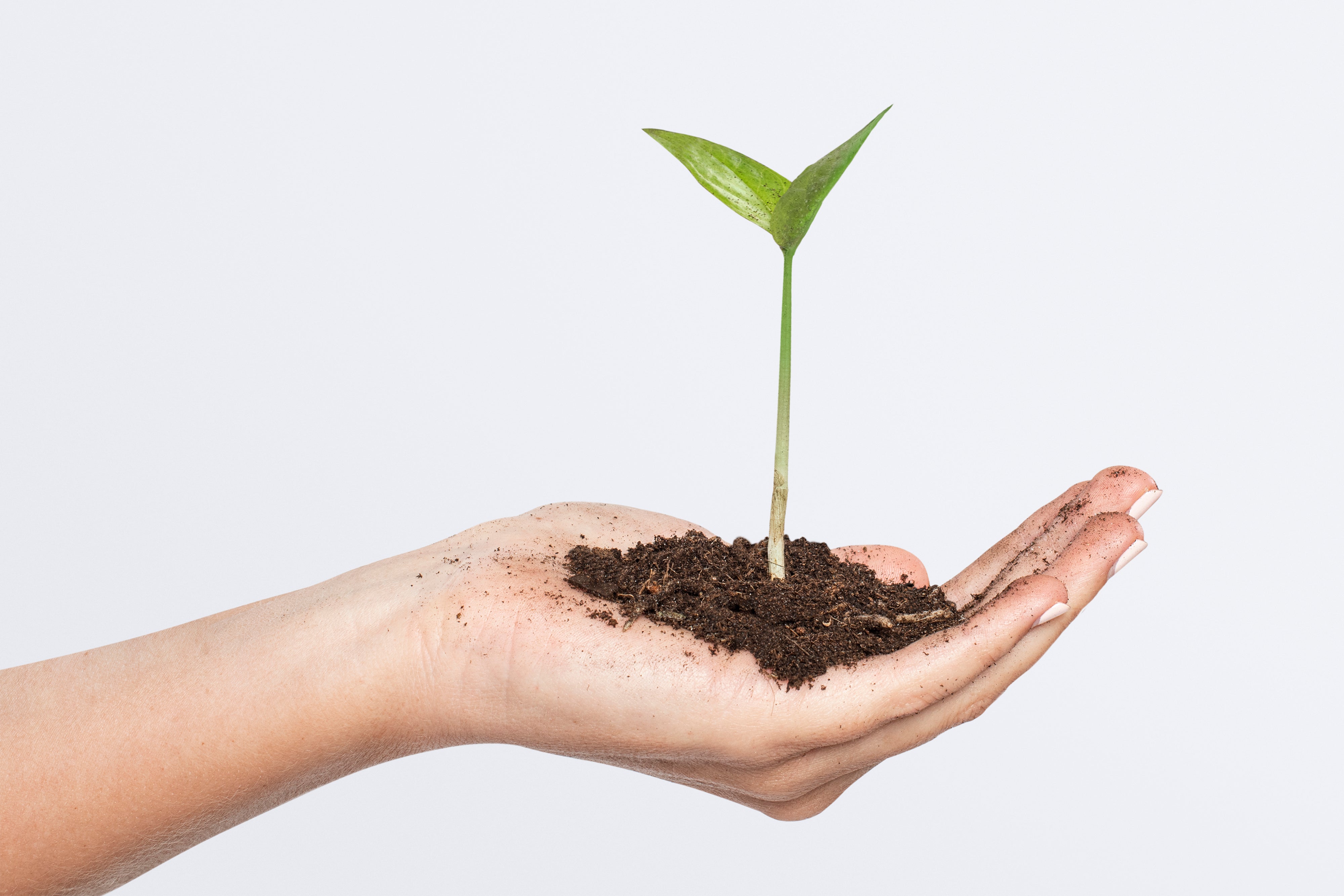Compost at Home Guide

“Natures generosity takes our compost and grows beauty!"
Composting Fundamentals:
Composting is Earth’s natural recycling process. It breaks down organic materials into nutrients that nourish the soil. This process not only reduces everyday waste, but also improves the health of our planet. Here’s our compost guide to help you begin your composting journey.
What is Composting?
Composting is a natural process that transforms kitchen scraps into nutrient-rich material, perfect for use as garden fertilizer. The end result of composting produces topsoil, which is a organic, nutrient-dense substance that, when mixed with soil, helps preserve moisture and nutrients, boosting plant growth and enhancing environmental health.
Plants require two things to grow and thrive: moisture and nutrient-dense soil. The way that soil gets its nutrients is from a natural process called composting. It is a process where you take organic waste materials, such as tree leaves, unwanted papers, and food scraps, and use them to produce vital nutrients for your soil.
Think of composting as a natural fertilizer that helps grow your plants and crops. Furthermore, it also reduces waste that would otherwise end up on the streets or in landfills. So, by composting the waste to enrich your soil with nutrients, you are doing your part to promote a cleaner, healthier environment.
How Does Composting Work?
You can compost all different kinds of organic materials, such as:
· Plants, Leaves, Fruits and Veggies
· Straw
· Coffee Grounds
· Eggshells
· Cardboard
· Wood chips
· Sawdust
· Newspapers
· Food scraps
· Heavenly Essentials (Made from the Flax Plant)!
The natural composting process involves converting a pile of these decayed or dead organic materials into nutrient-rich materials to serve as a fertilizer for your soil. These nutrient-rich materials represent the final compost material that you can apply under and on the surface of the soil.
Once you add the compost, the soil can retain more moisture and nutrients to stimulate plant growth and help the environment stay healthy.
The Benefits of Composting
Here is a list of all the benefits of composting:
· Recycle over 30% of normal household waste to promote a healthier environment.
· Reduces waste in landfills, which reduces greenhouse gasses like methane that pollute the environment.
· Good bacteria and microorganisms break down the decaying organic materials to help the soil absorb nutrients from them and stimulate plant growth.
· Soil maintains adequate moisture levels to deter pests and reduce plant disease.
· Compost is natural and healthier for your soil and the environment than the chemical fertilizers or synthetic fertilizers sold in home improvement stores.
· Compost is a natural fertilizer that produces better-quality fruits and vegetables in your garden.
What You Need to Get Started in Composting
Are you ready to get started composting your Heavenlies? Below are the basic steps involved in the composting process:
1) The first thing you need to do is find a dry, cool location in your yard with plenty of shade and drainage.
2) Add various organic materials to a compost pile in that area of your yard. These organic materials should include a mixture of green and brown materials like the following:
· Green materials may include vegetable scraps, fruit scraps, coffee grounds, eggshells, fur, hair, grass trimmings, fresh green leaves, etc. These materials provide the nitrogen and protein that compost needs to stay warm and stimulate the growth of its microorganisms.
· Brown materials may include pine needles, pine cones, dead brown leaves, shredded newspaper, and cardboard. These materials provide the carbon and carbohydrates that compost needs to feed its microorganisms and help them break down all the organic materials in the pile.
3) Make sure you layer the organic materials as you add them to the pile. Add water to each layer to keep them moist. That will make it easier for the microorganisms to feed their way through the organic materials quickly.
4) Use a garden fork to turn and mix up the layers to allow air to access all of them. Air is necessary to keep the microorganisms alive so that they can continue to break down the organic materials thoroughly.
What you’ll need to get started:
· Kitchen countertop composter - we love simplehumans stainless steel countertop composter.
· Backyard composter - we recommend using a durable, tumbling composter. Turn it 10 times after each ‘deposit’ to optimize your compost inside.
· We love the "Mill Kitchen Bin" - a stylish trash can that turns your food scraps into dirt, with the press of a button! https://www.mill.com/
Don’t have space to compost at home? Find a compost facility near you at www.findacomposter.com or join our Membership Rewards Program and have the Los Angeles Compost plant your Heavenlies for you!
Additional Tips
Microorganisms like bacteria and mold already exist in the organic materials. However, you need to help them survive by creating the necessary conditions for them to thrive. That way, they can deliver vital nutrients like nitrogen, potassium, and phosphorus to the soil, where it will remain as long as the compost stays viable.
Consider adding the organic materials to a special compost bin or backyard composter. These are special containers that create the ideal conditions for decomposing organic materials to produce nutrient-rich compost for soil and plants.
Materials to Avoid in Composting
Not all organic materials are good for composting. Remember that the best organic materials for composting belong to the “brown” and “green” categories, as outlined above.
The materials NOT RECOMMEND for composting include:
· Meats
· Fats
· Grease
· Oils
· Bones
· Milk & cheese (all dairy products are bad for composting)
· Coal
· Diseased plants and leaves
· Insect-infested plants and leaves
· Chemically-treated grass clippings
· Coal and ash
· Pet waste
Share your favorite composting updates with us at info@heavenlyessentials.us!

